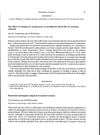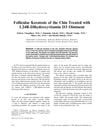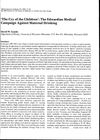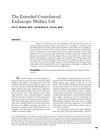January 2019 in “Journal of the Egyptian Women's Dermatologic Society (Print)” People with androgenetic alopecia have a higher risk of heart disease.
 2 citations,
April 2014 in “International Wound Journal”
2 citations,
April 2014 in “International Wound Journal” The V-Y-S plasty is a safe and effective one-stage method for repairing medium to large scalp defects.
 21 citations,
April 1990 in “Journal of comparative neurology”
21 citations,
April 1990 in “Journal of comparative neurology” The study found that nerve signals are stronger when there are more connection points, but not necessarily denser, along the nerve's path in the spine.
1 citations,
October 2019 in “Journal of Thoracic Oncology” Chemotherapy adds to, but doesn't enhance, the effects of immunotherapy in lung cancer treatment.
 22 citations,
March 1987 in “Journal of The American Academy of Dermatology”
22 citations,
March 1987 in “Journal of The American Academy of Dermatology” Minoxidil prolongs cell life, slows aging, and may produce longer hairs.
 20 citations,
September 1987 in “The Lancet” 4 citations,
September 2012 in “PubMed”
20 citations,
September 1987 in “The Lancet” 4 citations,
September 2012 in “PubMed”  2 citations,
June 1987 in “British Journal of Dermatology”
2 citations,
June 1987 in “British Journal of Dermatology” Warming hands improves blood flow in people with systemic sclerosis.
 13 citations,
July 2007 in “Pediatric dermatology”
13 citations,
July 2007 in “Pediatric dermatology” Vitamin D3 ointment improved skin bumps on the chin but didn't give lasting results after stopping use.
The best way to apply vitamin C to the skin is with a nanostructured lipid carrier formulation.
 10 citations,
August 2020 in “Indian Journal of Plastic Surgery/Indian journal of plastic surgery”
10 citations,
August 2020 in “Indian Journal of Plastic Surgery/Indian journal of plastic surgery” Hyaluronic acid filler injections are a favored non-surgical method to improve facial aging signs due to their convenience, effectiveness, and durability.
 2 citations,
September 2015 in “Clínica e Investigación en Arteriosclerosis”
2 citations,
September 2015 in “Clínica e Investigación en Arteriosclerosis” Some skin conditions may increase the risk of heart disease, but are not yet included in cardiovascular prevention guidelines.
 August 2013 in “Actas Dermo-Sifiliográficas”
August 2013 in “Actas Dermo-Sifiliográficas” Most Cochrane Skin Group reviews are helpful for improving dermatology practices, but some lack enough evidence for clinical recommendations.
 December 1984 in “British journal of addiction”
December 1984 in “British journal of addiction” Doctors linked maternal drinking to infant mortality and national decline, leading to public awareness and changes in law.
 6 citations,
March 1984 in “British journal of addiction”
6 citations,
March 1984 in “British journal of addiction” The Edwardian medical campaign linked maternal drinking to infant mortality and national decline, influencing hygiene education and leading to a ban on children under 14 from pubs.
 32 citations,
January 2003 in “Facial Plastic Surgery”
32 citations,
January 2003 in “Facial Plastic Surgery” The technique improves facial aging signs with a low risk of complications and a recovery time of about 3 weeks.
 66 citations,
October 1984 in “Annual Review of Microbiology”
66 citations,
October 1984 in “Annual Review of Microbiology” Toxic Shock Syndrome cases increased due to new factors, but decreased with public health measures and changes in tampon use.
 34 citations,
January 1977 in “American Journal of Cardiology”
34 citations,
January 1977 in “American Journal of Cardiology”  21 citations,
October 1978 in “The Journal of Clinical Pharmacology”
21 citations,
October 1978 in “The Journal of Clinical Pharmacology”  12 citations,
January 2015 in “Indian Journal of Dermatology, Venereology and Leprology”
12 citations,
January 2015 in “Indian Journal of Dermatology, Venereology and Leprology” Negative expectations can cause adverse effects in dermatology treatments, like with finasteride for baldness, and careful communication can help reduce these nocebo responses.
 2 citations,
January 1979 in “Yearbook of English studies”
2 citations,
January 1979 in “Yearbook of English studies” Nineteenth-century British drama closely reflected the era's societal values and concerns.
 63 citations,
December 2002 in “Archives of Dermatology”
63 citations,
December 2002 in “Archives of Dermatology” The 308-nm excimer laser is a promising treatment for vitiligo with varying success and mild side effects.

















